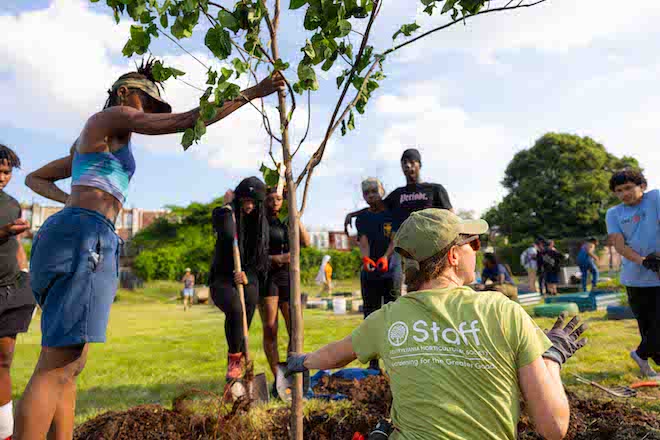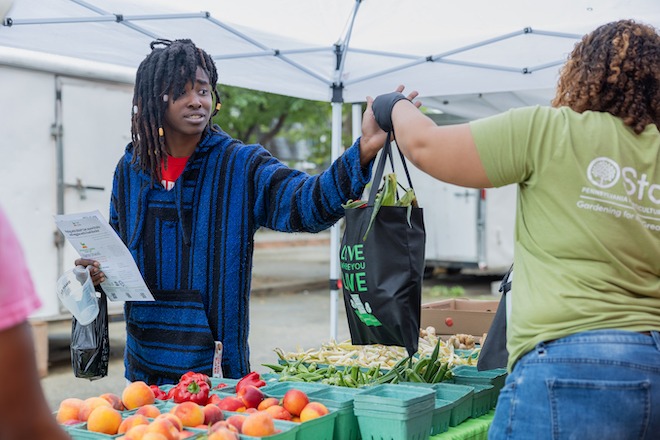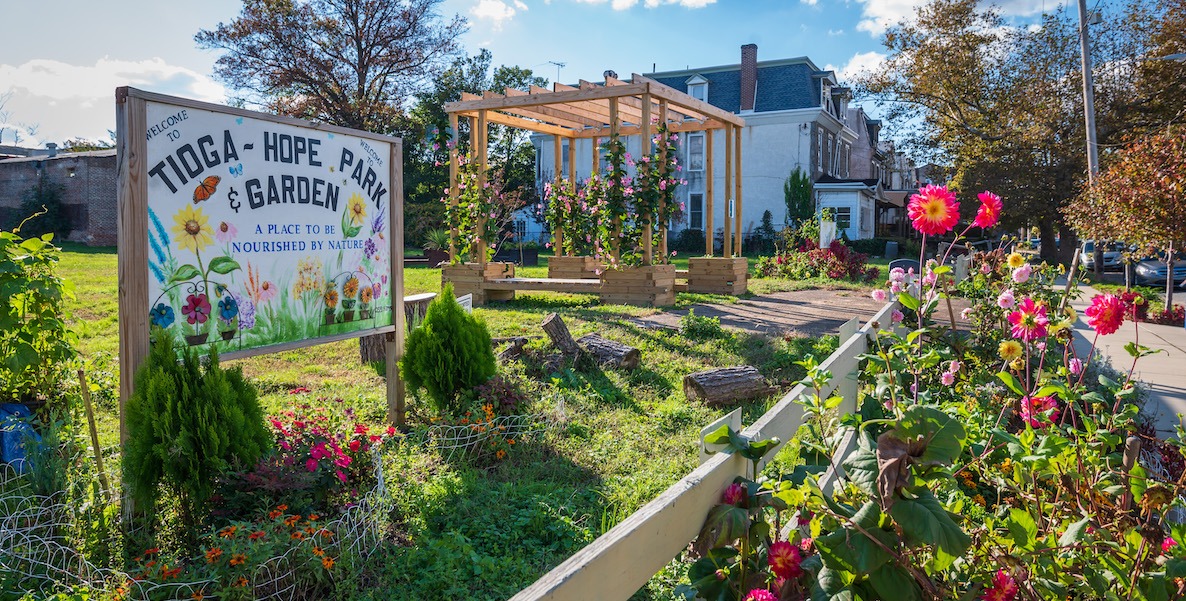This is a story about tapping into a very attainable means to brighten Philadelphia’s future. While Philadelphians are rightly proud of our dense, walkable, amenity-rich city and innate resilience, we still have a long way to go to make our residents safer, healthier, happier and more confident in our home. From where I stand, not just cleaning and greening Philadelphia, but also expecting Philadelphia to be clean and green, would go a long way to achieving our goals.
What would Philadelphia be like if every resident walked out their front door to a trash-free, tree-lined street near a community garden and a beautifully planted park?
Recent research from the Pew Research Center found 65 percent of residents feel like our city is on the wrong track. Earlier research found that 30 percent of Philadelphians are dissatisfied overall with city life. Even more concerning, 2019 data from the City of Philadelphia shows a more than 18-year difference in the expected lifespan of men in two neighborhoods just a few miles apart: Center City East and Nicetown-Tioga. We can and must do better.
Horticulture — the simple human act of growing and caring for plants and gardens — holds answers. A cleaner, greener city would make our blocks safer and more beautiful, connect residents to each other, create jobs and small business opportunities, and allow all of us to benefit from nature’s healing power.
What would Philadelphia be like if every resident walked out their front door to a trash-free, tree-lined street near a community garden and a beautifully planted park?
Why clean and green all of Philadelphia?
Research has long shown that people who live in neighborhoods with healthy tree canopy have lower rates of cardiometabolic disease and respiratory illness, as well as lower stress levels. People who use community gardens have better social connection and access to healthy foods. People, including children, with access to nature-rich parks are also healthier and happier.
Clean matters too. Here in Philadelphia, University of Pennsylvania researchers have found cleaning and greening vacant lots reduces nearby crime by 13 percent overall, reduces gun violence by nearly 30 percent, and reduces residents’ feelings of depression by nearly 70 percent. Maintenance of vacant lots also offers small business opportunities.

The Pennsylvania Horticultural Society (PHS)’s partnership with the City to spruce up vacant lots has created business for 34 nonprofits and small businesses, more than 78 percent Black or Brown led, supporting 250 jobs. We could have hired one large contractor to do this work. Instead, we invested our time and efforts to benefit the most Philadelphians possible — and create longer-term positive outcomes.
Still, today, only about 30 percent of Philadelphia’s vacant parcels are cleaned and greened. Our average tree canopy stands around 20 percent, with some neighborhoods having as little as 2.5 percent. This is shy of the 30 percent tree canopy coverage deemed “good.” (We would like to be “great.”) Philadelphia’s community gardens are regularly lost to development. Few of our parks offer users high quality gardens and landscapes.
What do we need to make this happen?
Executed through intentional public-private, community-led strategies, four transformative green investments can make PHS’s vision for Philadelphia reality:
1. Establish and maintain healthy tree canopy in every neighborhood.
2. Clean and green 100 percent of vacant land.
3. Preserve our 400+ community gardens.
4. Make high quality horticulture the norm in parks and public spaces.
- For over 50 years, PHS has worked to beautify Philadelphia. Today, we focus our energy on the neighborhoods facing the most inequitable health and safety outcomes, which tend to have the least investment and volunteerism. In places we’ve touched, we’ve made an impact. As of 2023, 1.14 million Philadelphians lived within a 5-minute walk of a PHS project — with 93 percent of those projects located in low- or moderate-income census tracts.
In the past two years, PHS partnered with the City of Philadelphia to create the public-private Philly Tree Coalition which secured a $12 million federal grant to begin implementing the Philly Tree Plan. We’ve also partnered with Mayor Parker’s Clean and Green Office to expand cleaning and greening of more than 12,000 vacant lots year-round. There’s still work to do.
Making all of Philadelphia cleaner and greener
The biggest obstacle is not only the obvious — money — it’s also our imagination. To capture this potential, Philadelphians must reset our sense of the possible. We must think of green streets as “must have” essentials for all rather than “nice to have” extras for a few. We must take collective responsibility for our entire city — and must put local communities in the driver’s seat while thinking regionally.

Greening efforts deliver the greatest impact when residents who already have ownership of and a vision for their neighborhoods lead the charge. Two good models are PHS’s partnership with residents in Nicetown and Tioga through the Love Where You Live initiative and PHS’s Tree Tenders program. Although every block is unique, programs like these are designed to scale and adapt to new communities, not just in implementation, but also in advocacy and fundraising.
Fully tapping the benefits of greening also requires ongoing investment to care for and maintain trees and gardens. PHS has built stable revenue streams for its work through strong partnerships with the City of Philadelphia, the Commonwealth, our members and donors, and foundations and corporations.
Together with the proceeds of the Philadelphia Flower Show, these sources will allow us to invest more than $21 million this fiscal year in neighborhoods and public spaces. Through acting as a “market maker,” PHS makes it possible for individuals who are passionate about greening to act. Scaling up will require significant increased support.
Let’s make this happen. Let’s adopt the mindset that green solutions should be a part of every neighborhood and every block. And, let’s invest in creating and managing these green assets. PHS built this call to action into its Green Equity Initiative — a proposal for over $10 million in funding for greening programs in Philadelphia — as well as the Green Living Plan — a collaborative plan to invest in stronger neighborhoods through environmental solutions.
Matt Rader is the 37th President of the Pennsylvania Horticultural Society. Focused on deepening and expanding PHS’s efforts to use horticulture to advance the health and well-being of the communities in Greater Philadelphia and beyond, he combines a passion for horticulture with a deep love for historic preservation and cities. Rader grew up in Mercersburg, Pennsylvania, received his bachelor’s in Architectural History from the University of Virginia and Master’s of Business Administration from the Wharton School at the University of Pennsylvania.
The Citizen welcomes guest commentary from community members who represent that it is their own work and their own opinion based on true facts that they know firsthand.
![]()
MORE ON CLEANING AND GREENING PHILADELPHIA



